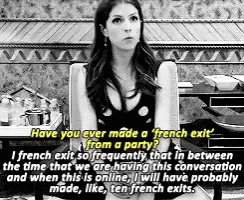What Does French Exit Mean?
The term French exit is slang that refers to leaving a social gathering or bad date without saying goodbye. It is similar to other terms such as ghosting, Irish goodbye, and Dutch leave. The term originated from the English term “French leave” and the French term “filer à l’anglaise,” both of which have derogatory connotations. These terms attribute unsavory behavior to the French or the English, depending on which side you’re on. In the United States, the most commonly used term for this act is “Irish goodbye,” which implies that the person leaving is too intoxicated to manage a proper farewell. Another less common variant is “Dutch leave,” which may evoke the image of someone leaving a gathering after indulging in some Dutch snacks. While goodbyes are often seen as polite, they can also be awkward and time-consuming. Ghosting, or performing a French exit, allows individuals to save time and avoid uncomfortable farewells. It is especially useful in larger social gatherings where your absence may go unnoticed. However, it is important to consider the size and context of the gathering before deciding to ghost. If you feel that a formal goodbye is necessary, you can always send a heartfelt email or a text message after leaving. Ultimately, ghosting can be a more efficient and stress-free way to leave a social gathering without causing any offense.



What Does French Exit Mean From a Girl?
When a girl uses the term French exit, it generally means the same thing as when anyone else uses it. It refers to leaving a social gathering or a bad date without saying goodbye. Girls use this slang term in a similar way to guys and everyone else.
Here are a few key points to consider:
- Specific meaning from a girl: Girls use the term French exit to describe the act of leaving a social gathering without saying goodbye, just like guys and everyone else.
- How girls use it: Girls may use French exit in conversations with their friends or when discussing social events where they have left without saying goodbye.
- How to reply: If someone performs a French exit and you want to acknowledge their departure, you can always send them a message later expressing your gratitude for their presence or apologizing for not being able to say goodbye.
In general, girls do not use French exit differently compared to everyone else. The slang term has a universal meaning and usage across genders. So, if a girl mentions performing a French exit, you can understand it in the same way as if a guy or anyone else mentioned it.
Example 1:
- Girl A: Did you see Sarah at the party last night?
- Girl B: Yeah, she totally pulled a French exit. She left without saying goodbye to anyone.
Example 2:
- Girl A: I had a terrible date last night.
- Girl B: Oh no, what happened?
- Girl A: It was so bad that I had to do a French exit. I couldn’t wait to leave.
Example 3:
- Girl A: Did you see Emily leave the party early?
- Girl B: Yeah, she did a French exit. She didn’t want to make a big deal out of leaving.
Example 4:
- Girl A: I’m so tired of saying goodbye at every social event.
- Girl B: I know, sometimes it’s easier to just do a French exit and slip away unnoticed.
Example 5:
- Girl A: I can’t believe I forgot to say goodbye to everyone at the party.
- Girl B: Don’t worry about it, sometimes a French exit is the best option.
What Does French Exit Mean From a Guy?
When a guy uses the term French exit, it typically means the same thing as when anyone else uses it. It refers to leaving a social gathering or a bad date without saying goodbye. Guys use this slang term in a similar way to girls and everyone else.
Here are a few key points to consider:
- Specific meaning from a guy: Guys use the term French exit to describe the act of leaving a social gathering without saying goodbye, just like girls and everyone else.
- How guys use it: Guys may use French exit in conversations with their friends or when discussing social events where they have left without saying goodbye.
- How to reply: If someone performs a French exit and you want to acknowledge their departure, you can always send them a message later expressing your gratitude for their presence or apologizing for not being able to say goodbye.
In general, guys do not use French exit differently compared to everyone else. The slang term has a universal meaning and usage across genders. So, if a guy mentions performing a French exit, you can understand it in the same way as if a girl or anyone else mentioned it.
Example 1:
- Guy 1: Hey, did you see that party last night? It was getting pretty boring.
- Guy 2: Yeah, I couldn’t take it anymore, so I decided to pull a French exit. No need for goodbyes!
Example 2:
- Guy 1: I was on a terrible date last night. I couldn’t wait to leave.
- Guy 2: Dude, why didn’t you just do a French exit? No need to suffer through it.
Example 3:
- Guy 1: The concert was amazing, but I had to leave early because of work.
- Guy 2: Ah, the classic French exit move. At least you got to enjoy some of it!
Example 4:
- Guy 1: I went to this networking event, but it was a total snooze fest.
- Guy 2: Should’ve done a French exit, man. No need to waste your time on boring events.
Example 5:
- Guy: I was at this party and it was getting way too crowded. So, I decided to do a French exit and escape the chaos.
What Does French Exit Mean Sexually?
No, French exit does not have a sexual or NSFW meaning. It refers to leaving a social gathering or bad date without saying goodbye.
Origin of French Exit
The term “French exit” is slang that refers to leaving a social gathering or bad date without saying goodbye. It is similar to other terms such as ghosting, Irish goodbye, and Dutch leave. The term originated from the English term “French leave” and the French term “filer à l’anglaise,” both of which have derogatory connotations. These terms attribute unsavory behavior to the French or the English, depending on which side you’re on. In the United States, the most commonly used term for this act is “Irish goodbye,” which implies that the person leaving is too intoxicated to manage a proper farewell. Another less common variant is “Dutch leave,” which may evoke the image of someone leaving a gathering after indulging in some Dutch snacks. While goodbyes are often seen as polite, they can also be awkward and time-consuming. Ghosting, or performing a French exit, allows individuals to save time and avoid uncomfortable farewells. It is especially useful in larger social gatherings where your absence may go unnoticed. However, it is important to consider the size and context of the gathering before deciding to ghost. If you feel that a formal goodbye is necessary, you can always send a heartfelt email or a text message after leaving. Ultimately, ghosting can be a more efficient and stress-free way to leave a social gathering without causing any offense. The origin of the term is not clear, but it likely emerged as a slang phrase to describe this specific behavior.
Frequently Asked Questions
Slangs similar to French Exit
Ghosting, Irish goodbye, Dutch leave, vanishing act, and disappearing act are all similar to a “French exit” because they all describe leaving a social gathering without saying goodbye. These terms all refer to the act of leaving without notice or without proper farewell, allowing individuals to save time and avoid awkward or uncomfortable farewells.
Is French Exit A Bad Word?
No, “French exit” is not a bad word or vulgar word. It is a term that describes the act of leaving a social gathering or bad date without saying goodbye. It is similar to ghosting, Irish goodbye, and Dutch leave. The term originated from the English calling it “French leave” since 1751 and the French referring to it as “filer à l’anglaise” since at least the late 1800s. While it may be considered rude to leave without saying goodbye, the term itself is not vulgar or offensive.
Is French Exit a Typo or Misspelling?
No, “french exit” is not a misspelling or a typo. It is a slang term that refers to leaving a social gathering or bad date without saying goodbye, similar to other terms like ghosting, Irish goodbye, and Dutch leave.





